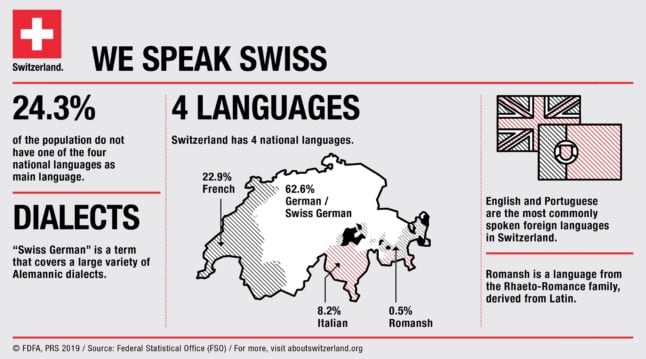In Numbers: Just how diverse is the Swiss population?

People who live abroad often think of tiny Switzerland as a culturally and ethnically homogenous country. But nothing could be further from the truth.
A new report by the Council of Europe commended Switzerland's commitment to protecting its linguistic, cultural, and religious diversity.
But just how exactly does this diversity manifest itself?
In its report titled ‘Diversity and co-existence,’ the Swiss government points out that "the Swiss population comprises many social groups and people from a variety of backgrounds".
For instance, it mentions that:
- About three people out of 10 were born abroad
- About four out of 10 have a migration background
- More than 190 nationalities live in the country
- There are more than 10 main religious communities
- Switzerland has four national languages
- 10 non-national languages are widely spoken
Let’s look closer at some of these numbers:
One country, four languages
If you really think about it, it is pretty amazing that a small country like Switzerland has four official languages — German, French, Italian, and Romansh.
What’s even more amazing is that all the linguistic groups co-habit peacefully, which is not always the case in nations with more than one official language.
Take, for instance, Belgium and Canada, where, historically, there have been tensions between French/Flemish, and English/French-speaking communities, respectively.
In Switzerland, however, all groups get along, even though Swiss German is by far the most predominant language, as this chart from the Federal Statistical Office shows:

Image by the Federal Statistical Office
The two most widely spoken non-national languages are English and Portuguese.
READ ALSO: How did Switzerland become a country with four languages?
A nation of immigrants
People of many ethnicities and nationalities live in Switzerland.
In fact, Switzerland is in third place in terms of the share of immigrants in its population of all the countries belonging to the Organisation of Economic Cooperation and Development (OECD).
Foreigners account for 26 percent of the total population: at the end of December 2022, 2,241,854 foreign nationals were living permanently in Switzerland.
Most (335,755) come from Italy, followed by Germans (317,544), Portuguese (257,829), and French (157,769).
People from the Balkan nations of Serbia, Macedonia, and Kosovo also form a sizeable community of over 243,000.
The biggest segment of the foreign population (722,690) is under the ‘other’ category — that is, people from countries other than those mentioned above.
All this shows that Switzerland is a truly multi-national country.
READ ALSO: How foreigners are changing Switzerland
Religions
Switzerland started out as a Christian nation, and still remains predominantly so: some 62 percent of the population still identify themselves as either Protestants or Roman Catholics.
However, over time, people of other faiths arrived in Switzerland as well.
Today, Islamic religious community accounts for 5.2 percent of Switzerland’s population; 0.3 percent are Jewish; and 1.4 percent belong to other religious denominations.
And while we are on the subject of diversity...
Switzerland has the highest proportion of trans or non-binary people
According to a survey carried out recently by Ipsos research institute in 30 countries and reported on in Swiss media, Switzerland has the highest proportion of people who identify as transgender, non-binary, or gender-fluid.
A total of six percent of respondents described themselves as transgender, non-binary, gender-fluid, or other than male or female, according to the survey. This proportion is the highest of all 30 countries surveyed, ahead of Thailand with five percent and Italy, Sweden, Germany and Spain at four percent.
In terms of the number of LGBT+ adults, Switzerland is in third place worldwide, behind Brazil and Spain, according to the survey.
Comments
See Also
A new report by the Council of Europe commended Switzerland's commitment to protecting its linguistic, cultural, and religious diversity.
But just how exactly does this diversity manifest itself?
In its report titled ‘Diversity and co-existence,’ the Swiss government points out that "the Swiss population comprises many social groups and people from a variety of backgrounds".
For instance, it mentions that:
- About three people out of 10 were born abroad
- About four out of 10 have a migration background
- More than 190 nationalities live in the country
- There are more than 10 main religious communities
- Switzerland has four national languages
- 10 non-national languages are widely spoken
Let’s look closer at some of these numbers:
One country, four languages
If you really think about it, it is pretty amazing that a small country like Switzerland has four official languages — German, French, Italian, and Romansh.
What’s even more amazing is that all the linguistic groups co-habit peacefully, which is not always the case in nations with more than one official language.
Take, for instance, Belgium and Canada, where, historically, there have been tensions between French/Flemish, and English/French-speaking communities, respectively.
In Switzerland, however, all groups get along, even though Swiss German is by far the most predominant language, as this chart from the Federal Statistical Office shows:

Image by the Federal Statistical Office
The two most widely spoken non-national languages are English and Portuguese.
READ ALSO: How did Switzerland become a country with four languages?
A nation of immigrants
People of many ethnicities and nationalities live in Switzerland.
In fact, Switzerland is in third place in terms of the share of immigrants in its population of all the countries belonging to the Organisation of Economic Cooperation and Development (OECD).
Foreigners account for 26 percent of the total population: at the end of December 2022, 2,241,854 foreign nationals were living permanently in Switzerland.
Most (335,755) come from Italy, followed by Germans (317,544), Portuguese (257,829), and French (157,769).
People from the Balkan nations of Serbia, Macedonia, and Kosovo also form a sizeable community of over 243,000.
The biggest segment of the foreign population (722,690) is under the ‘other’ category — that is, people from countries other than those mentioned above.
All this shows that Switzerland is a truly multi-national country.
READ ALSO: How foreigners are changing Switzerland
Religions
Switzerland started out as a Christian nation, and still remains predominantly so: some 62 percent of the population still identify themselves as either Protestants or Roman Catholics.
However, over time, people of other faiths arrived in Switzerland as well.
Today, Islamic religious community accounts for 5.2 percent of Switzerland’s population; 0.3 percent are Jewish; and 1.4 percent belong to other religious denominations.
And while we are on the subject of diversity...
Switzerland has the highest proportion of trans or non-binary people
According to a survey carried out recently by Ipsos research institute in 30 countries and reported on in Swiss media, Switzerland has the highest proportion of people who identify as transgender, non-binary, or gender-fluid.
A total of six percent of respondents described themselves as transgender, non-binary, gender-fluid, or other than male or female, according to the survey. This proportion is the highest of all 30 countries surveyed, ahead of Thailand with five percent and Italy, Sweden, Germany and Spain at four percent.
In terms of the number of LGBT+ adults, Switzerland is in third place worldwide, behind Brazil and Spain, according to the survey.
Join the conversation in our comments section below. Share your own views and experience and if you have a question or suggestion for our journalists then email us at [email protected].
Please keep comments civil, constructive and on topic – and make sure to read our terms of use before getting involved.
Please log in here to leave a comment.